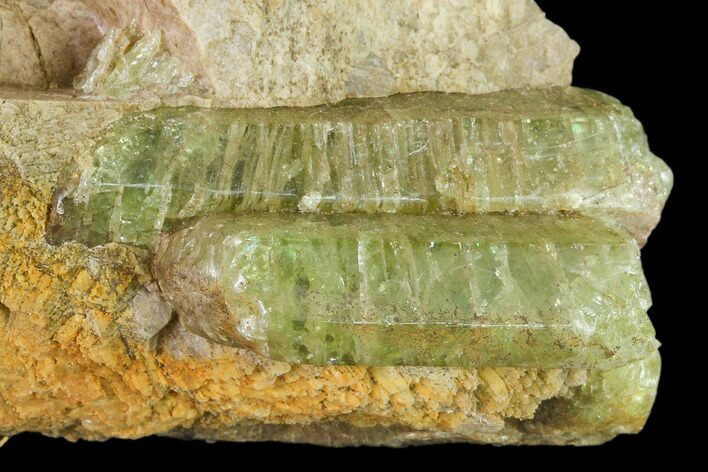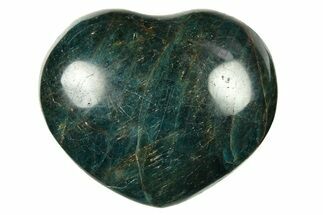This Specimen has been sold.
2.5" Yellow-Green Fluorapatite Crystals in Calcite - Ontario, Canada
These are fluorapatite crystals that were collected from Tory Hill in Ontario, Canada, a digging locality that is now closed.
Fluorapatite is the most common variety in the apatite group. It's known to form early in almost all igneous rock as small, microscopic crystals. It can display a wide variety of colors and can be confused with beryl, phenakite and milarite. Often forming bright, lustrous crystals with hexagonal faces and off-center terminations. They are found in vugs, often associated with quartz and calcite. Most complete crystals are around an inch in length, though larger crystals up to about 4 inches long have been found.
Fluorapatite is the most common variety in the apatite group. It's known to form early in almost all igneous rock as small, microscopic crystals. It can display a wide variety of colors and can be confused with beryl, phenakite and milarite. Often forming bright, lustrous crystals with hexagonal faces and off-center terminations. They are found in vugs, often associated with quartz and calcite. Most complete crystals are around an inch in length, though larger crystals up to about 4 inches long have been found.
About Calcite Crystals
Calcite crystals are a form of calcium carbonate (CaCO₃) known for their diverse shapes, transparency, and vibrant range of colors. They typically form in rhombohedral, scalenohedral, or prismatic shapes, often with well-defined, sharp edges and glossy surfaces. Calcite crystals are often translucent or transparent, sometimes displaying a double refraction effect where objects viewed through the crystal appear doubled. They can appear in various colors—white, clear, yellow, pink, blue, green, and orange—depending on impurities or trace minerals.
A notable characteristic of calcite is its reaction with weak acids like vinegar, which causes it to effervesce, or fizz, as it releases carbon dioxide. This property makes calcite crystals a key tool in geological identification and studies. Calcite forms in many environments, from sedimentary rocks like limestone and marble to hydrothermal veins.
Calcite crystals are a form of calcium carbonate (CaCO₃) known for their diverse shapes, transparency, and vibrant range of colors. They typically form in rhombohedral, scalenohedral, or prismatic shapes, often with well-defined, sharp edges and glossy surfaces. Calcite crystals are often translucent or transparent, sometimes displaying a double refraction effect where objects viewed through the crystal appear doubled. They can appear in various colors—white, clear, yellow, pink, blue, green, and orange—depending on impurities or trace minerals.
A notable characteristic of calcite is its reaction with weak acids like vinegar, which causes it to effervesce, or fizz, as it releases carbon dioxide. This property makes calcite crystals a key tool in geological identification and studies. Calcite forms in many environments, from sedimentary rocks like limestone and marble to hydrothermal veins.
SPECIES
Fluorapatite & Calcite
LOCATION
Bear Lake Diggings, Tory Hill, Ontario, Canada
SIZE
2.5" wide specimen
CATEGORY
ITEM
#137114
 Reviews
Reviews














